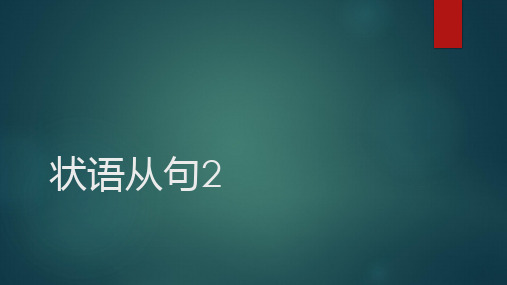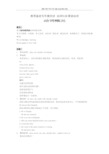雅思语法复习状语从句
雅思状语从句语法讲义

雅思状语从句语法讲义1.目的状语从句目的状语从句的连接词包括so that, in order that, in case, lest。
雅思实例:(阅读) In 1986 the International Olympic Committee changed the schedule so that the summer and winter games would be held in different years.(阅读) However, no matter which lifestyle do people choose, the chosen one should be insisted lest our biological clock might get confused.(写作) 我认为应该鼓励老人住养老院(nursing house),这样才能受到专业的照顾。
I think senior citizens should be encouraged to live in a nursing house ___________2. 结果状语从句结果状语从句的连接词包括so…that…,such…that…等。
such + a+ adj + n 与 so + adj + a + n句型的互换例句: (口语) My brother is such a forgetful person that he is always forgetting something important.My brother is so forgetful a person that he is always forgetting something important.(口语) How did you come here this morning?我早上是坐地铁一号线来的。
地铁一号线巨挤无比,我每次坐都几乎无法呼吸。
雅思英语15状语从句(2)

for引导的是并列句表示原因但并不说明主句行为发生的直接原因, 只提供一些辅助性的引导的并列句只能放于主句之后并且必须用逗 号将其与主句隔开。
他不可能见过我因为我不在那 ① He could not have seen me, for I was not there. 他现在几乎不出去了,因为他很老了。 ② He seldom goes out now, for he is very old.
他有如此长的胳膊以至于他基本上能摸到天花板
He had such long arms that he could almost touch the ceiling.(天花板)
So~that 与 such ~that
So…that语such...that可以互换 这是如此有趣的一场电影以至于我们都想再看一次 It was such a wonderful film that all of us wanted
状语从句2
三、原因状语从句
最常用的连词是: because, since, as, now (that)等
because,because of
Because 后面加句子 Because of后面不接从句, 只能接名词, 代词或动名词。
注意:because 和so 不可同时出现在一个句子里。
Main body: supporting idea 1 + examples
同样,工业用机器节省了劳动力,并增加了输出。用奥斯卡。王尔德的话-"事 实是,文明ห้องสมุดไป่ตู้要奴隶"。希腊人在文明要求奴隶制存在的观点是非常正确的。
Likewise Industry Machine Reduce Manpower
雅思语法

练习:
• 只要每个人都能意识到环境保护的重要性,并采取有效措 施,我坚信我们一定能克服污染问题。 • the significance of environmental protection • take some effective measures • overcome
练习:
• 只要每个人都能意识到环境保护的重要性,并采取有效措 施,我坚信我们一定能克服污染问题。 • the significance of environmental protection • take some effective measures • overcome • As long as everyone realizes the significance of environmental protection and takes some effective measures, I firmly believe that we can overcome the pollution problem.
练习:
• 当谈到国际体育比赛,诸如奥林匹克运动会和世界杯足球 赛,有些人认为它能增进国与国之间的友谊并促进主办国 的经济。
• when it comes to • the Olympic Games
•
the World Cup Soccer Game
• promote friendship • boost the economy of the host country
练习:
• 人们喜欢在能充分发挥他们才华的地方工作。 • fully display their talents
练习:
• 人们喜欢在能充分发挥他们才华的地方工作。 • fully display their talents • People prefer to work where they can fully display their talents.
雅思英语16状语从句(3)

2 用even though / even if引导:
even though和even if意思相同,均表示“即使”,常可互换。
即使你有很多钱,我也不会爱你。 Even though you have a lot of money, I won’t love you. 就算你看见是他拾起的钱,你也不能肯定钱就是他偷的。 Even if you saw him pick up the money, you can’t be sure
一旦开始,就绝不要停止 Once you begin,never stop. 一旦你理解了规则,数学就不难学了 Maths is easy to learn once you understand the rules.
1.Dis na ( will go/go/goes) to Europe if she (will pass/pass/passes) the exams .
Main body: supporting idea 1
A广告负面的影响: 不理智消费, 买过时有瑕疵的东西, 东西堆积, 从来不用
Main body: supporting idea 1
在一方面,广告会让我们在家里堆积大量的东西,而这些东西我们或许从来 都不会再用。
On one hand Advertisement Pile up Never Ever
Jeans
Brand
There be
Two-on-one
FOofrfeerxample, recently, I bought three pairs of jeans of Levis brand because there
雅思语法复习状语从句知识讲解

状语从句的分类
时间状语从句 原因状语从句 结果状语从句 让步状语从句 方式状语从句
地点状语从句 目的状语从句 条件状语从句 比较状语从句
时间状语从句
1.When 当…时候
When the project began, Makete District was virtually totally isolated during the rainy season. (剑7,T2,R)
(1)那个年轻人看书一直到熄灯。 The young man read till the light went out.
(2)我会一直呆在这直到他来。 I will stay here until he arrives.源自not …until 直到…才
The problems doctors accepted as normal in a 65-year-old in 1982 are often not appearing until people are 70 or 75. (剑6, T2,R)
注意:while强调主句和从句的动作同时发生,从句 谓语的动词是延续性动词,且多用进行时。
4. As 当…时,一边…一边
(1)The frequency of riots(暴乱) rises dramatically as the weather gets warmer.(剑3,T3,R)
(2) As time went on, he became wiser and wiser.
Hardly…when /No sooner… than
表示过去发生的事情,主句用过去完成时,从 句用过去时。
(1)I had hardly got back to the kitchen, when the phone rang again.
雅思写作之状语从句

雅思基础写作第四讲动词与非谓语动词动词概况定义:表示动作或状态的词叫做动词。
可分为四类,分别是:实义动词、系动词、助动词、情态动词。
有些情况下,有些动词是兼类词:We are having a meeting.He has gone to New York.分类:1.实义动词--- play, eat, murder, investigate2.系动词本身有词义,系动词后面必须接表语,用来说明主语的状况、性质、特征等。
be;seem, look, appear;remain, keep, stay;feel, smell, sound, look;become, turn, grow, fall;prove, turn out翻译:这谣言证明有假。
他开会时总是保持沉默。
他看起来很生气。
这花闻起来很香。
他梦想成为一名保安。
3.助动词---be, have, do, shall, will, should, would协助主要动词构成谓语动词的词叫助动词。
助动词自身没有词义,不可单独使用:He doesn't like English.助动词协助主要动词完成以下功用,可以用来:a. He is singing.He has got married.b. He was sent to England.c. Did you study English before you came here?d. I don't like him.e. Do come to the party tomorrow evening.He did know that.4.情态动词---must, need, can, may, should, dare , ought to, have to情态动词用法?Exercise: find all the verbs that are contained in the following passage.A good chess playerA man went to visit a friend and was amazed to find him playing chess with his dog. He watched the game in astonishment for a while. "I can hardly believe my eyes!" he exclaimed. "That's the smartest dog I've ever seen.""Nah, he's not so smart," the friend replied. "I've beaten him three games out of five."非謂語動词:讓句子簡潔有力定义:在句子中充当除谓语以外的句子成分的动词形式叫做非谓语动词。
剑9雅思阅读中的状语从句
雅思阅读中的状语从句因为不是主干,所以可能通常都被考生忽略掉。
其实,状语从句有多种类型,比如时间状语刑拘、地点状语从句、原因状语从句、让步状语从句等等,今天就来给大家分享一下剑9 雅思阅读中的状语从句。
状语从句 (Adverbial Clause) 状语从句指句子用作状语时,起副词作用的句子。
它可以修饰谓语、非谓语动词、定语、状语或整个句子。
根据其作用可分为时间、地点、原因、条件、目的、结果、让步、方式和比较等从句。
状语从句一般由连词(从属连词)引导,也可以由词组引起。
从句位于句首或句中时通常用逗号与主句隔开,位于句尾时可以不用逗号隔开。
一、时间状语从句1. Thus, when Hofmann made some passing comments about the desirability ofa synthetic substitute for quinine, it was unsurprising that his star pupil was moved to take up the challenge. (剑9 Test 1 Passage 1 )我们先来认识一些单词:1. synthetic(合成的)2. quinine(n. 奎宁)句子结构分析:Thus连词,因而。
When引导时间状语从句, it was unsurprising that…表示毫不奇怪,是it is/was+adj. + that结构句式。
译文:因此,当Hofmann随口提到想用合成药物来替代奎宁时,自然而然,他的得意门生Perkin马上承担起了这项重任。
2. An alien civilisation could choose many different ways of sending information across the galaxy, but many of these either require too much energy, or else are severely attenuated while traversing the vast distances across the galaxy.(剑9 Test 1 Passage 2)我们先来认识一些单词:1. galaxy (n. 星系)2. attenuated(adj. 衰减的)句子结构分析:这句话的主干是An alien civilisation could choose…but many of these either require too much en ergy, or …while…,这句话里包含either…or…句式,表示或者……或者……,while引导时间状语从句。
6 托福雅思语法培训-状语从句
1. When he reads a book, his habit is to make a mark _______ the meaning is unclear to him.
A. there
B. wherever
C. the place
D. in which
2. If you are travelling ______ the customs are totally different from your own, you may feel a cultural shock.
A. in the place
B. which
C. in which
D. where
3. 原因状语从句
原因状语从句表示主句中的某一动作或状态所发生的原因。引 导这种从句 常用的连接词是:because, since, as, for, now that 及 considering等。
e.g. He didn’t come to school because he was ill. 表示“直接”原因。
4. 条件状语从句
条件状语从句表示主句中的某一动作或状态是在什么情况 或条件下发生的。条件状语从句中通常用一般现在时表示将来。
条件状语从句由从属连词引导:if, unless (除非), as / so long as (只要), on condition (只要), in case (假使) , providing / provided (that) 等。
A. as
B. if
C. when D. where
2. Some people believe that ______ oil is running out, the fate of the motor industry is uncertain.
雅思——状语从句+分词做状语
状语
➢ 修饰动词、形容词、副词或整句的词或句。按照功能分为:时间、地点、原 因、目的、结果、方式、条件、让步、比较。常做状语的有副词、介词短语、 状语从句、to do、doing、done 6种。
➢ 状语从句:完整句+引导词+完整句
地点状语从句
➢ 引导词:where; wherever; no matter where ➢ They arrived where they had fallen in love ten years ago. 在……的地方 ➢ I like the place where you study IELTS.……的 ➢ You may go anywhere you like.
• Do advantages outweigh disadvantages? • 如果女性可以休产假,那么公司在录取员工的时候肯定会把这个情况考虑在
内,这会阻碍女性在职场中担任很重要的角色尽管他们的能力很高。
2018-10-13
• In many countries women are allowed to take maternity leave from their jobs during their first month after the birth of their baby.
常用复杂句
② After+句子/being done(被动)/doing(主动) • 鱼被运输到工厂之后,被解冻。
常用复杂句
② After+句子/being done(被动)/doing(主动) • 鱼被运输到工厂之后,被解冻。 • After being transported at the factory, the fish are defrosted. • 在到达学校之后,我们决定去看电影 • After arriving at school, we decided to watch movies. • 在被削皮之后,马铃薯会被放在微波炉中加热。 • After being peeled, the potatoes are heated in microwave oven.
剑桥雅思语法八状语从句
二、地点状语从句
We should go where the people needs us most. You are free to go wherever you like. Where there is a will, there is a way. Where there is smoke, there is a fire. You’d better make a mark where you have any
questions. You’d better make a mark at the place where you have
any questions.
三、原因状语从句
--Why are you absent from the meeting? --Because I am ill.
As it is raining, we shall not go to the park. As he is working hard, he is likely to succeed. Now that/since everybody is here, let’s begin our
He didn’t get up early enough to catch the bus. He got up too late to catch the bus. He got up so late to catch the bus.
- 1、下载文档前请自行甄别文档内容的完整性,平台不提供额外的编辑、内容补充、找答案等附加服务。
- 2、"仅部分预览"的文档,不可在线预览部分如存在完整性等问题,可反馈申请退款(可完整预览的文档不适用该条件!)。
- 3、如文档侵犯您的权益,请联系客服反馈,我们会尽快为您处理(人工客服工作时间:9:00-18:30)。
Hardly…when /No sooner… than
表示过去发生的事情,主句用 过去完成时 ,从 句用过去时。 (1)I had hardly got back to the kitchen, when the phone rang again.
(2) He had no sooner arrived home than he was asked to start on another journey.
状语从句
状语从句的分类
时间状语从句 原因状语从句 结果状语从句 让步状语从句 方式状语从句
地点状语从句 目的状语从句 条件状语从句 比较状语从句
时间状语从句
1.When 当…时候
When the project began, Makete District was virtually totally isolated during the rainy season. (剑7,T2,R)
By the time 与两种完成时态搭配
从句
主句
一般过去时
过去完成时
一般现在时 (表将来)
将来完成时
翻译练习
1. When in Rome,do as the Romans do.
2. Since the test were introduced, AIS athletes in all sports have been remarkably successful at staying healthy. ( 剑6)
5. Before/After
(1)Before 在…之前 Think twice before you act.
(2)After 在…之后
我做完作业之后,就立刻去睡觉。 I went to bed immediately after I finished my homework.
6. Since 自从…
项目开展初期时,马科特地区在般现在时表示将来
当他回来了我将会告诉他事实。 I'll tell him the truth when he comes back.
2. Whenever/no matter when 何时
无论
(1)You can choose a password so that, whenever we visit you at home, you will know it is us. (剑7, G,TA,L)
(1)那个年轻人看书一直到熄灯。 The young man read till the light went out.
(2)我会一直呆在这直到他来。 I will stay here until he arrives.
not …until 直到…才
The problems doctors accepted as normal in a 65-year-old in 1982 are often not appearing until people are 70 or 75. ( 剑6, T2,R)
注意:while强调主句和从句的动作同时发生,从句 谓语的动词是延续性动词,且多用进行时。
4. As 当…时,一边…一边
(1)The frequency of riots( 暴乱) rises dramatically as the weather gets warmer.( 剑3,T3,R)
(2) As time went on, he became wiser and wiser.
自从应用了这种测试方法,AIS所有运动项目的 运动员都一直保持着健康状态。
3. 学生们可以在演出开始 45分钟前买备用票 。(剑6) ( Standby tickets)
Students can get Standby tickets 45 minutes before a performance begins.
9. By the time 到…时候为止
(1) By the time I got to the station, the train had left. (2)By the time I graduate next year, I will have lived here for five years.
你可以设个密码,这样每次我们来你家你就知 道是我们来了。
(2)我们什么时候有空,我们就去那。
We shall go there whenever we are free.
3. While/Whilst当…时候,与…同时
(1) The doorbell rang while we were watching TV. (2)我正在写作业的时候,电话响了。 The phone rang while I was writing my homework.
(1) We have known each other since we were in primary school.( 剑3,T4,R)
(2) It is just a week since we arrived here.
从句时态常为一般过去时,主句时态通常为现在完成 时或一般现在时。
7. Till/Until 直到…为止
在1982年,医生们认为 65岁的人所患属于正常 的疾病现在往往直到 70或75岁才会出现。
8. 表示“一…就…”
as soon as /hardly…when /no sooner…than /once/immediately /directly/the moment (that)
a. As soon as I arrive there, I will call you. b. Once it stops raining, we will leave. c. It began to rain immediately I arrived home. d. I came here directly I got your massage. e. The moment I heard the song, I felt cheerful.
